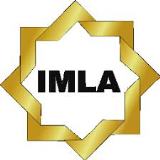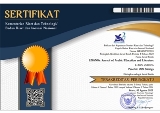Integrating Arabic Curriculum and Pesantren Cultural Identity in the Arabic Education Program of UNSIQ
DOI:
https://doi.org/10.18326/lisania.v9i1.226-246Keywords:
Arabic Curriculum, Pesantren Cultural Identity, Cultural ReproductionAbstract
The Arabic language curriculum of the Arabic Language Education Program at pesantren-based universities has not fully accommodated the cultural values of pesantren as a local identity embedded within the learning process. Consequently, a dilemma arises between the effort to strengthen Arabic language proficiency in the academic sphere and the preservation of pesantren cultural traditions, which are the soul of education in this environment. This study aims to explore the relationship between the Arabic language curriculum and pesantren cultural identity within higher education, focusing on the Arabic Language Education Program (PBA) at Universitas Sains dan Al-Qur'an (UNSIQ). Employing an educational anthropology approach, this research analyzes how the curriculum shapes the habit, cultural capital, and identity of students with pesantren backgrounds. Utilizing qualitative methods, data were gathered through participatory observations, in-depth interviews, and document studies involving lecturers, students, and curriculum developers. The findings reveal that the curriculum emphasizes not only linguistic but also pedagogical aspects, and it integrates Islamic and socio-cultural values of pesantren. The Arabic curriculum at PBA UNSIQ serves as a cultural reproduction mechanism that reinforces student identity through the use of the yellow book-based learning method, traditional pesantren evaluation systems, and socio-religious approaches in lectures. However, challenges remain, particularly in accommodating non-pesantren students who must adapt to the pesantren-based academic traditions. To foster a more inclusive learning environment, PBA UNSIQ integrates modern learning methods, technological utilization, and mentoring programs for students with diverse educational backgrounds.
References
Akom, A. (2008). Ameritocracy and Infra‐racial Racism: Racializing Social and Cultural Reproduction Theory in the Twenty‐first Century. Race Ethnicity and Education, 11(3), 205–230. https://doi.org/10.1080/13613320802291116
Anastasia, B. (2023). Shadow Education and Social Class Inequalities in Secondary Education in Greece: The Case of Teaching English as a Foreign Language. Endless International Journal of Future Studies, 6(2), 18–32. https://doi.org/10.54783/endlessjournal.v6i2.148
Anisah, S., & Abidin, M. (2024). Correlation Between Students’ Educational Background and Motivation With Learning Outcomes in Arabic Language Class X at Islamic International Boarding School (Iibs) Al-Maahira. 2(3), 181–186. https://doi.org/10.18860/kitaba.v2i3.27709
Anwar, M. S., Wargadinata, W., Nurhadi, N., & Maghfiroh, R. (2023). Implementasi Metode Pembelajaran Bahasa Arab: Studi Kasus Di PJJ Pai Iain Syekh Nurjati Cirebon. 1(1), 54–69. https://doi.org/10.69493/ajoal.v1i1.13
Astari, D. J., Banjarnahor, Y. Y., Sihite, L. M., & Batubara, A. (2024). Pendekatan Pendidikan Integratif Dalam Menanggulangi Westernisasi Pada Generasi Muda. 1(2), 9. https://doi.org/10.47134/diksima.v1i2.8
Azaola, M. C. (2012). Revisiting Bourdieu: Alternative Educational Systems in the Light of the Theory of Social and Cultural Reproduction. International Studies in Sociology of Education, 22(2), 81–95. https://doi.org/10.1080/09620214.2012.700187
Dewantara, J. A., Cahya, E. N., Sulistyarini, S., Efriani, Purnama, S., & Afandi, A. (2023). Mempertahankan Identitas Lokal Di Era Globalisasi Melalui Sanggar Seni Bougenville. Jurnal Borneo Akcaya, 8(2), 112–126. https://doi.org/10.51266/borneoakcaya.v8i2.240
Edgerton, J. D., & Roberts, L. W. (2014). Cultural Capital or Habitus? Bourdieu and Beyond in the Explanation of Enduring Educational Inequality. Theory and Research in Education, 12(2), 193–220. https://doi.org/10.1177/1477878514530231
Fadhilah, N. (2024). Dinamika Identitas Budaya Dalam Masyarakat Multikultural: Sebuah Studi Kasus Di Kota Jambi. 1(2), 12–16. https://doi.org/10.62872/h2088e95
Fatjerin, L. R., & Budirahayu, T. (2021). The Struggle of Tengger Tribal Youths Using Higher Education to Get Social and Cultural Status in Society. Jurnal Sosiologi Dialektika, 16(1), 64. https://doi.org/10.20473/jsd.v16i1.2021.64-75
Fitria, N., CHAIRY, A. C. H., & NAHDIYAH, A. C. F. (2024). Mengurai Kompleksitas Budaya Organisasi Dalam Konteks Manajemen Pendidikan Pada Lembaga Pendidikan Tinggi. 1(4), 136–142. https://doi.org/10.61116/jksm.v1i4.257
Haerulloh, A. A., Nurrohmah, S. L., Alim, M., & Ampera, T. (2021). Identitas Budaya Dan Sejarah Suku Bajo Di Bajo Pulau Pascanomaden. Metahumaniora, 11(1), 75. https://doi.org/10.24198/metahumaniora.v11i1.32115
Hakim, A. R., & Darojat, J. (2023). Pendidikan multikultural dalam membentuk karakter dan Identitas Nasional. Jurnal Ilmiah Profesi Pendidikan, 8(3), 1337–1346.
Haluti, F., Jumahir, J., & Sukmawati, S. (2024). Pembelajaran Agama Islam Dan Kearifan Lokal: Strategi Integrasi Budaya Dalam Kurikulum Sekolah Dasar. Jurnal Pendidikan Islam Al-Ilmi, 7(2), 125–131. https://doi.org/10.32529/al-ilmi.v7i2.3495
Huda, N. (2017). Manajemen Pengembangan Kurikulum. Al-Tanzim: Jurnal Manajemen Pendidikan Islam, 1(2), 52–75.
Huda, N., & Afrita, J. (2023). Pentingnya Bahasa Arab Dalam Pendidikan Diplomasi Dan Hubungan Internasional. Jurnal Pendidikan Indonesia, 4(11), 1242–1252. https://doi.org/10.59141/japendi.v4i11.2335
Ilmiani, A. M., Ahmadi, A., Rahman, N. F., & Rahmah, Y. (2020). Multimedia Interaktif Untuk Mengatasi Problematika Pembelajaran Bahasa Arab. Al-Ta Rib Jurnal Ilmiah Program Studi Pendidikan Bahasa Arab Iain Palangka Raya, 8(1), 17–32. https://doi.org/10.23971/altarib.v8i1.1902
Istanti, D. J. (2019). Dinamika Kebijakan Kurikulum Pendidikan di Indonesia Pasca Reformasi. Jurnal Ilmu Politik Dan Pemerintahan, 5(2), 140–156.
Istianah, A., Darmawan, C., Sundawa, D., & Fitriasari, S. (2024). Peran Pendidikan Kebinekaan Dalam Pendidikan Kewarganegaraan Untuk Menciptakan Lingkungan Sekolah Yang Damai. Jurnal Moral Kemasyarakatan, 9(1), 15–29. https://doi.org/10.21067/jmk.v9i1.10192
Jæger, M. M., & Breen, R. (2016). A Dynamic Model of Cultural Reproduction. American Journal of Sociology, 121(4), 1079–1115. https://doi.org/10.1086/684012
Keysha, Maulani, H., & Tatang, T. (2023). Pengaruh Latar Belakang Pendidikan Pondok Pesantren Modern Terhadap Motivasi Belajar Bahasa Arab. Al-Ittijah Jurnal Keilmuan Dan Kependidikan Bahasa Arab, 15(1), 1–17. https://doi.org/10.32678/alittijah.v15i1.7619
Khasanah, L. N., & Tantowi, Y. A. (2023). Problematika Pembelajaran Bahasa Arab Pada Mahasiswa Lulusan Umum Di Prodi Pendidikan Bahasa Arab Universitas Pendidikan Indonesia. Tadris Al- Arabiyyah Jurnal Pendidikan Bahasa Arab Dan Kebahasaaraban, 2(1), 113–123. https://doi.org/10.15575/ta.v2i1.23072
Khitom, K., & Taufik, T. (2023). Kurikulum Pembelajaran Bahasa Arab Di Perguruan Tinggi Keislaman Islam Negeri (PTKIN). Tadris Al-Arabiyat Jurnal Kajian Ilmu Pendidikan Bahasa Arab, 3(1), 28–44. https://doi.org/10.30739/arabiyat.v3i1.1766
Kusumawati, I., & Nurfuadi, N. (2024). Integrasi Kurikulum Pesantren Dalam Kurikulum Nasional Pada Pondok Pesantren Modern. 2(01), 1–7. https://doi.org/10.58812/spp.v2i01.293
Lestari, S. I., Rasyid, I., Yasmadi, Y., Taufiqurrahman, M., & Arsyad, H. (2024). تأثير خلفية تعليمية الطلاب اللغة العربية على نتائج تعليم القواعد الأساسية بجامعة الحكومية الإسلامية إمام بونجول بادانج. Thariqah Ilmiah Jurnal Ilmu-Ilmu Kependidikan Dan Bahasa Arab, 12(1), 1–19. https://doi.org/10.24952/thariqahilmiah.v12i1.10909
Liu, Y. (2019). The “Lost Seekers” in Elite Universities: The Intersection of Family, Social, and University. https://doi.org/10.3102/1434173
Mills, C. (2008). Reproduction and Transformation of Inequalities in Schooling: The Transformative Potential of the Theoretical Constructs of Bourdieu. British Journal of Sociology of Education, 29(1), 79–89. https://doi.org/10.1080/01425690701737481
Moll, F. de, Grecu, A., & Hadjar, A. (2023). Students’ Academic Habitus and Its Relation to Family Capital: A Latent Class Approach to Inequalities Among Secondary School Students1. Sociological Inquiry, 94(1), 190–220. https://doi.org/10.1111/soin.12578
Muassomah, M. (2023). From Global Language Use to Local Meanings: Arabic to Indonesian Absorption. Iasjol, 1(1), 16–29. https://doi.org/10.62033/iasjol.v1i1.10
Nuha, M. A. U., & Faedurrohman, F. (2022). Manajemen Perencanaan Kurikulum Bahasa Arab (Tinjauan Ontologi, Epistemologi Dan Aksiologi). Al-Muyassar Journal of Arabic Education, 1(2), 203. https://doi.org/10.31000/al-muyassar.v1i2.6488
PBA, P. (n.d.). Buku Kurikulum Program Studi Pendidikan Bahasa Arab. Web Resmi FITK UNSIQ. Retrieved March 2, 2025, from https://fitk-unsiq.ac.id/index.php/struktur-kurikulum-pba/
Sarjito, A. (2024). Membangun Kesatuan Bangsa Melalui Pendekatan Pemberdayaan Sosial Dan Budaya Masyarakat Papua. Journal of Governance and Policy Innovation, 4(1), 1–13. https://doi.org/10.51577/jgpi.v4i1.472
Selmia, S., Susiawati, S., & Kudus, R. (2022). Pengaruh Latar Belakang Pendidikan Siswa Terhadap Hasil Belajar Pada Mata Pelajaran Bahasa Arab Di Kelas X MAS Pesantren Tarbiyah Takalar. 2(2), 161. https://doi.org/10.59562/al-fashahah.v2i2.40437
Sendana, A. K., Palimbong, D. R., Sendana, L. K., & Patanduk, S. T. (2024). Penerapan Motivasi Dan Kesopanan Berbasis Budaya Lokal Melalui Media Bahasa Dalam Kurikulum Pengajaran Di Tingkat SD. Jurnal Onoma Pendidikan Bahasa Dan Sastra, 10(3), 2502–2508. https://doi.org/10.30605/onoma.v10i3.3775
Solekhah, F. (2022). Pengaruh Sosial Budaya, Latar Belakang Pendidikan, Pengalaman Kerja, Dan Motivasi Kerja Terhadap Etos Kerja Karyawan Bank Syariah Indonesia KCP Tulungagung Sudirman. Ihtiyath Jurnal Manajemen Keuangan Syariah, 6(1), 78–93. https://doi.org/10.32505/ihtiyath.v6i1.3912
Steinmetz, G. (2011). Bourdieu, Historicity, and Historical Sociology. Cultural Sociology, 5(1), 45–66. https://doi.org/10.1177/1749975510389912
Tambunan, R. (2023). Kepercayaan Parmalim Dalam Relasi Agama Dan Budaya. 3(12), 442–473. https://doi.org/10.56393/decive.v3i12.2059
Tovar‐Gálvez, J. C. (2021). Teaching Practice in Acculturation Educational Settings: A Case Study on an Integration Course. European Journal of Teaching and Education, 3(1), 20–33. https://doi.org/10.33422/ejte.v3i1.655
Triyanto, T., Fauziyah, F., & Hadi, M. T. (2019). Bahasa Sebagai Pendidikan Budaya Dan Karakter Bangsa. Jurnal Salaka Jurnal Bahasa Sastra Dan Budaya Indonesia, 1(1). https://doi.org/10.33751/jsalaka.v1i1.1145
Wahdah, N., Mubarak, M. R., Hamidah, H., Audina, N. A., & Ilmiani, A. M. (2022). Peer Teaching Method to Support the Students’ Learning Motivation in Arabic Speaking Skills During the Covid-19 Pandemic. Ijaz Arabi Journal of Arabic Learning, 5(2). https://doi.org/10.18860/ijazarabi.v5i2.11660
Yosso, T. J. (2005). Whose Culture Has Capital? A Critical Race Theory Discussion of Community Cultural Wealth. Race Ethnicity and Education, 8(1), 69–91. https://doi.org/10.1080/1361332052000341006
Downloads
Published
Issue
Section
License
Copyright (c) 2025 Rifqi Aulia Rahman, Uril Bahruddin , Nurhadi Nurhadi

This work is licensed under a Creative Commons Attribution-NonCommercial-ShareAlike 4.0 International License.






